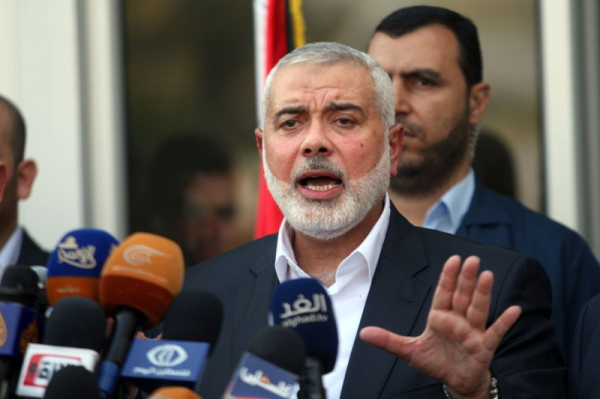
Hamas Chief Ismail Haniyeh (C) was assassinated in the Iranian capital of Tehran on Wednesday. File Photo by Ismael Mohamad/ UPI. | License Photo
Hamas’ political chief Ismail Haniyeh was assassinated Wednesday in Tehran, according to statements from both the militia and Iran’s Islamic Revolutionary Guard Corp.
Hamas, an Iran-back group, confirmed Haniyeh’s death in a statement to the WAFA Palestinian news agency. The IRGC said in a statement carried by Iran’s semi-official Tasnim News Agency that Haniyeh was killed along with one of his bodyguards at his residence in the Iranian capital. Advertisement
Specifics of the assassination were not immediately clear, but the IRGC statement said Haniyeh was in Tehran to attend the the searing-in ceremony of Masoud Pezeshkian as Iran’s new president.
Al Mayadeen, a Lebanese-based media organization aligned with Hezbollah, another Iran proxy militia, reported that Haniyeh was killed by a missile launched from another country. Advertisement
Israel has been waging war against Hamas in the Palestinian enclave of Gaza since the militia launched a bloody surprise attack on the Middle Eastern country Oct. 7. Prime Minister Benjamin Netanyahu of Israel has vowed war will continue until “total victory” is achieved, which includes the elimination of Hamas and its leaders.
It has yet to comment on the assassination, but its military, Israel Defense Forces, said in an 8 a.m. statement Wednesday that there were no changes to its home defense policy and it was conducting a situation assessment.
Amichay Eliyahu, Israel’s far-right heritage minister, celebrated Haniyeh’s death, stating it “makes the world a slightly better place.”
“This is the right way to cleanse the world of this filth,” he said on X. “The iron hand that strikes them is what will bring quiet and some comfort, and strengthen our ability to live in peace with those who desire peace.”
Haniyeh has been Hamas’ political bureau chief since 2017, and he was designated by the United States the following year. In May, the International Criminal Court requested arrest warrants for Israel and Hamas leaders, including Haniyeh on accusations of committing war crimes amid the war. Advertisement
Hussein Al-Sheikh, secretary general of the Executive Committee of the Palestine Liberation Organization, said on X that they “strongly denounce and condemn” the attack on Haniyeh, which he described as a “cowardly act” that pushes “us to remain more steadfast in the face of occupation.”
Iranian Foreign Affairs Ministry spokesman Nasser Kanaani offered his nation’s condolences in a statement to the Palestinian people, Hamas and resistance groups, stating Haniyeh’s death “will further strengthen the deep and unbreakable bond between the Islamic Republic of Iran and dear Palestine and the resistance.”
A spokesperson for Yemen’s Houthi rebels, a third Iran proxy militia, described the assassination in a statement as “a heinous terrorist crime.”
And Qatar, which is where Hamas’ political arm is located and where Haniyeh ahd resided, said it considers the attack in Iran a “heinous crime and a dangerous escalation.”
Its ministry said in a statement that it “emphasizes that this assassination and the ongoing Israeli behavior of targeting civilians will lead to further tension and undermine international efforts aimed at establishing peace.
The attack came after the IDF said it killed commander Fuad Shukr of Hezbollah in a airstrike in Lebanon on Tuesday. Advertisement
The IDF said the strike was retaliatory. Though Hezbollah denies responsibility, the Israelis blame it for an attack on the weekend that killed a dozen children in occupied Golan Heights.
The attack into Lebanon and now into Iran raise already high fears that the war in Israel could spread through the region.
Michael DiMino of Defense Priorities, a Washington-based foreign policy think tank, said that while these attacks are not unexpected, their timing is likely to cause further escalation that could draw the United States, Israel’s ally, into another Middle Eastern war.
“Hezbollah — and now Iran — will be under immense pressure to respond forcefully to these strikes. As a result, the Levant and broader Middle East stand at the precipice of a much larger conflict,” he said in a statement emailed to UPI.
According to the Palestinian Ministry of Health, 39,400 Palestinians have been killed in the nearly 300-day-old war and another roughly 91,000 have been injured.